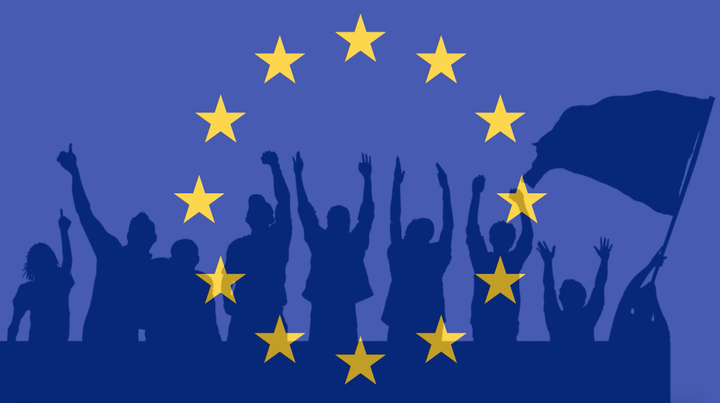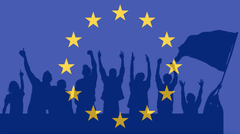
How can the EU regulate freedom of expression online?

When Twitter in January decided to suspend US President Donald Trump’s account, it caused reactions all over the world.
In the EU, a spokesperson for the German chancellor Angela Merkel said the ban was “problematic”, since the fundamental right of freedom of expression only can be interfered with within the framework defined by lawmakers, not according to a decision from social media platforms.
The French Finance Minister Bruno Le Maire said that “the regulation of the digital world cannot be done by the digital oligarchy,” and in Poland, the government introduced new draft legislation, that will fine social media platforms, if they “unjustly” suspend users or remove content, promising to fight the “totalitarian censorship” by social media firms. Consequently, cyberhate monitors got concerned that this law would allow greater abuse of minorities, especially LGBT people, who are not covered by Poland´s hate crime laws.
Already before the events on Capitol Hill, the EU Commission has published proposals for legislation regulation of digital platforms through the Digital Services Act and Digital Markets Act.
What are we expecting from the legislation proposed by the EU Commission? How does online platforms influence our freedom of expression? How to regulate the contents of social networks while “scrupulously” respecting freedom of expression, as the head of EU diplomacy, Josep Borrell, put it? Also how should we apply protection of freedom of expression differently online than offline, if we should? These questions form the basis of a debate with Karen Melchior (Danish MEP) and Julia Reda (former German MEP).
The debate is organized by Demokrati i Europa Oplysningsforbundet (DEO). It takes place online Thusday March 18, 2021, 16:00-17:00.
The debate is free, but registration is required. You can register here. Then you will receive a link Thursday morning. From there you can log into the meeting from your computer/tablet.
For more information, contact:
Project manager and analyst Vibe Termansen
Nøgleord
Kontakter
Vibe TermansenSeniorprojektleder og analytiker
Ekspert i polsk politik, samfund og historie. Følger med i samudviklingen i hele Centraleuropa, derunder demokrati- og retsstatsprincipper, medier, menneskerettigheder, LGBT, historiepolitik, klima, udvandring, fri bevægelighed, og forholdet til udlandet.
Vibe er cand.mag. i historie og østeuropastudier. Arbejdede som journalist og redaktør ved Weekendavisen 2008-18. Desuden har hun arbejdet for Den danske Ambassade i Warszawa, skrevet for Information og holdt foredrag. Hun udgav i 2019 bogen Kampen om Centraleuropa.
Billeder
Links
Information om DEO
DEO er et landsdækkende oplysningsforbund, som arbejder for demokrati i Europa. Vi er partipolitisk neutrale, men stiller kritiske spørgsmål og sætter problemer til debat. Vi arbejder for at engagere folk i EU-spørgsmål og søger at skabe rammerne for en levende og kvalificeret demokratisk debat.
DEO’s formål er at fremme debat og oplysning om Den Europæiske Union. Ud fra en demokratisk tankegang ønsker vi at aktivere flest mulige i en alsidig og fordomsfri debat om det europæiske samarbejdes indhold og rammer.
Følg pressemeddelelser fra DEO
Skriv dig op her, og modtag pressemeddelelser på e-mail. Indtast din e-mail, klik på abonner, og følg instruktionerne i den udsendte e-mail.
Flere pressemeddelelser fra DEO
Værsgo’: Ekspertcitater om 50-året for dansk EU-medlemskab30.9.2022 15:51:31 CEST | Pressemeddelelse
På søndag den 2. oktober er det præcis 50 år siden, danskerne var til folkeafstemning om optagelse i det daværende EF. Debatten op til folkeafstemningen var benhård og ja- og nej-fløjen er siden stødt sammen ved otte yderligere folkeafstemninger. Læs mere fra EU-eksperterne bag ny bogudgivelse om 50-året her.
Prisuddeling: Mickey Gjerris* modtager Demokratistafetten på Grundlovsdag [klausuleret til 5/6]5.6.2022 08:00:00 CEST | Pressemeddelelse
Sanger og komiker Annika Aakjær modtog Ebbe Kløvedal Reichs Demokratistafet i 2021. På grundlovsdag giver hun stafetten videre til bioetiker og teolog Mickey Gjerris*, der får pligt til at løfte den demokratiske debat i det kommende år. Modtageren afsløres på grundlovsmødet i Vartov den 5. juni.
I dag afgøres forsvarsforbeholdets skæbne1.6.2022 06:00:00 CEST | Pressemeddelelse
Efter tre årtier ser Danmark ud til at skifte EU-politisk kurs. Op til 4,25 millioner vælgere har mulighed for at stemme enten ja eller nej til afskaffelsen af forsvarsforbeholdet i dag. Valgdeltagelsen og de mange tvivlere er de to jokere i forhold til meningsmålingerne, der peger på et solidt ja.
DEO indtager Christiansborg med heldagskonference om Europas fremtid6.5.2022 11:04:08 CEST | Pressemeddelelse
Den 10. maj debatterer vi Europas fremtid med politikere og landets skarpeste eksperter
Største oplysningsprojekt om forsvarsforbeholdet går i luften i dag5.5.2022 11:40:29 CEST | Pressemeddelelse
I dag den 4. maj lanceres oplysningsavisen om forsvarsforbeholdet på hjemmesiden www.eu-forbeholdet.dk. Avisen er politisk neutral og med en bevilling på 1,85 mio. kr. det absolut største oplysningsprojekt forud for folkeafstemningen. Bag projektet står OLFI, DEO, RIKO og Atlantsammenslutningen.

 DEO
DEO